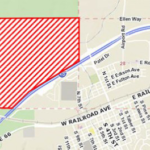
Arizona Business Exchange is reporting that theme park developers are considering a $400M, 488-acre theme park near the Grand Canyon to draw even more tourists from within Arizona and to boost the draw of northern Arizona for out-of-staters.
Michigan-based Granger Group is also eyeing property in metro Phoenix for a second major theme park, which could be a Disney park, a Six Flags, a Busch Gardens or one run by any of at least seven other companies.
Developers aren’t making a public announcement about the parcel in Maricopa County because negotiations are still under way.
The theme-park site in Williams is in the northwest portion of the city on Interstate 40. Williams, which is 32 miles west of Flagstaff, has a year-round population of 3K and developers say the theme park could employ at least 2K people.
Granger Group wants to begin construction in Williams in April 2016.
“They admit that’s a very aggressive schedule, and we are going to try to accommodate that as much as possible, but it may be further down the road,” said Williams City Manager Brandon Buchanan.
Gary Granger of the Granger Group recently told the Williams City Council that the Williams theme park could be a stepping-stone to a Phoenix project.
Also appearing at the council meeting was another Granger executive, Greg Markvluwer, who told the council that his company’s mission is to “reclaim the Grand Canyon as an Arizona destination.”
Feasibility study under way; board appointed
An unidentified Los Angeles company is conducting a feasibility study on the parks, aided by the Granger Group and the newly appointed, five-member governing board of the Arizona Theme Park Tax District.
Board members are Phoenix City Council members Michael Nowakowski and Daniel Valenzuela; Craig Fritsinger, a member of the Williams City Council; Ken Edes; and David Phelps. The chairman of the board is Fritsinger, and the vice chairman is Nowakowski. The next meeting is at 1 p.m. March 27 in the Williams City Council chambers.
Phelps, a Cave Creek resident who owns a summer camp near Williams, is a project manager for Arrow Material Services. Williams resident Edes is pastor of the Canyon Chapel, a Four Square Church.
An advocate of the theme park is Max Biegert, who owns homes in Paradise Valley and Flagstaff. Biegert owns the Williams property where the park would be located and reportedly has an option with the Granger Group for Granger to buy the property if the theme park becomes reality.
In the late 1980s, Biegert and his wife, Thelma, bought and revived the Grand Canyon Railway, which runs from Williams to the south rim of the Grand Canyon.
“It is a major part of our tourism-based economy,” said Buchanan, who credited Biegert with playing “a huge part in saving this town.”
According to council minutes, Biegert told the council that the theme park would be as good for the community, county and state as the railway has been.
At least 2K new employees would need housing
The minutes show the theme park could operate nine months of the year, and initially 2K employees would be hired, who would require housing. People working in maintenance and marketing would work year-round.
Asked how the company would help Williams with infrastructure including water and traffic, Markvluwer said the company would hire a consultant, with advice from the council, to ascertain needs and ways to address those needs.
“This has the potential to have a very big impact on our community, so we need to properly vet it and understand what it is and what it will mean for us,” said Buchanan.
“It’s very exciting for this community, and it has the potential for a large economic impact. We are approaching it with caution but also very optimistic about what it could mean for our community,” he said.
City officials and the Granger Group have been talking about the possibility of a park for some time, and the city is concerned that the park be one of quality.
‘No roller coaster in the middle of asphalt’
“We told them from the get-go that (the park) had to be something that fit the quality and character of Williams,” Buchanan said. “We’re more interested in a theme park than an amusement park. … We want it to fit into the natural environment that we value so much around here, versus a roller coaster in the middle of an asphalt parking lot.”
One of the concerns to be addressed is whether there is sufficient water. Another consideration for Williams is fire protection, since the city has only a volunteer fire department.
“If all of a sudden we have a major theme park, is the associated growth going to be okay; are we going to be able to serve with a volunteer fire department?” Buchanan said. “If the size of the city doubles in the next two or three years, will it increase the work load where the current staff won’t be able to handle it? … Water, electricity, sewers, streets, everything is going to have to be looked at to make sure we can accommodate their and our needs.”
The Granger Group’s website says that since 1997, the company has acquired and developed more than 70 properties with a total value of more than $1B.
Among the projects developed is a LEED-certified, 180-acre health complex in the town of Wyoming, Michigan, which includes acute care, wellness, retail, senior living, hospitality and educational services.
Gary Granger told the Williams council that he expects a theme park to be self-sustaining financially and that he would use 9% of the revenue generated from the theme park to pay off the bonds. The operators won’t pay property taxes.
Full story can be found here: https://azbex.com/williams-eyed-for-400m-theme-park/


